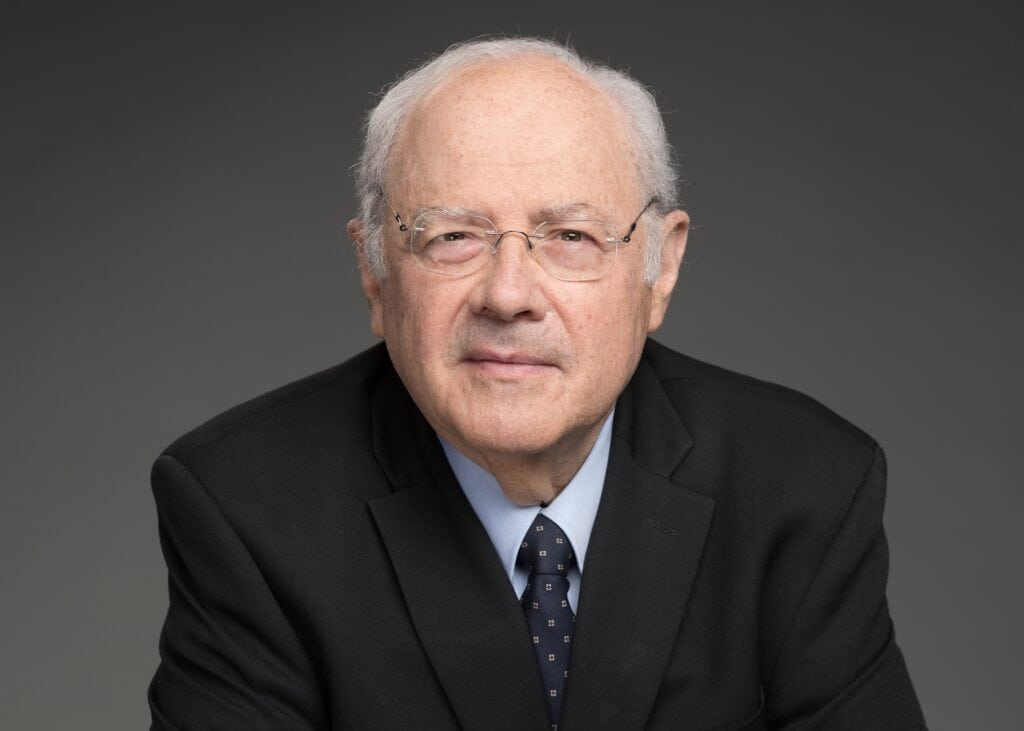
Norman Wolmark, M.D., FACS, FRCSC, is renowned for pioneering lumpectomy as the standard of care for invasive and non-invasive breast cancer. His groundbreaking work to eliminate the need for radical mastectomy has improved the quality of life for countless breast cancer patients worldwide.
But Dr. Wolmark points to his work bringing clinical trials into the scientific mainstream as his preeminent career achievement. Over the last four decades, Dr. Wolmark has led numerous clinical trials, including two of the largest chemoprevention clinical trials that secured FDA approval for tamoxifen and raloxifene in breast cancer prevention for people at high risk of breast cancer.
“Our work convinced surgeons and clinicians and medical oncologists that the standard of care needs to be defined using the scientific method.”
Dr. Wolmark received the 2022 Brinker Award for Scientific Distinction in Clinical Research for spearheading more effective and less invasive options for breast cancer care, as well as shifting the breast cancer research field into a preventive and more personalized standard of care.
“Our work convinced surgeons and clinicians and medical oncologists that the standard of care needs to be defined using the scientific method,” Dr. Wolmark said. “Prior to that, we were in an age of tyranny, in essence, when anyone could ascend to the professorial pulpit and armed with a retrospective case series could virtually dictate how a disease was treated for the better part of a century.”
Dr. Wolmark described the breast cancer surgical field as “hostile” when he entered it in 1973, as radical mastectomy had long been considered the standard of care for patients. He worked closely with the National Surgical Adjuvant Breast and Bowel Project (NSABP), a clinical trials cooperative, to challenge the absolute need for radical mastectomy through clinical trials.
“I remember being booed by an audience of several thousand when we were describing the results of protocol B04, which was the pivotal trial that challenged the retreat from radical mastectomy, and subsequently B06, which was the lumpectomy trial,” Dr. Wolmark said. “Fortunately, the data were convincing, and these trials did change the standard of care dramatically.”
Pioneering Clinical Trials
Dr. Wolmark first became interested in breast cancer during his surgical oncology fellowship at Memorial Sloan Kettering Cancer Center. At the time, breast cancer was not a specialty area of study, but Dr. Wolmark forged his own path in the field by leading clinical trials.
“Because of my interest in clinical trials and because I realized that therapy was being carried out completely devoid of objective scientific data, I became very interested in the treatment of early breast cancer — again, using the scientific method and clinical trials as a platform,” Dr. Wolmark said.
In addition to his work in initiating clinical trials, Dr. Wolmark also led the development of the 21-gene recurrence score assay, Oncotype DX, a tumor profiling test that predicts the chance of metastasis and helps determine the benefit of using chemotherapy in addition to hormone therapy in certain patients.
Dr. Wolmark believes his success in challenging the radical mastectomy paved the way for the ascent of systemic therapy and the first clinical trials for adjuvant chemotherapy.
“It raised the question whether adjuvant chemotherapy was working for premenopausal patients through a hormonal mechanism by targeting the ovaries,” Dr. Wolmark said. “It’s a question that’s still relevant today.”
Following his success in developing the oncotype assay, Dr. Wolmark is preparing to initiate a new clinical trial that will examine whether radiation therapy is necessary for women with high risk, early-stage breast cancer with an oncotype score of under 18.
In addition to transforming the standard of care for patients, Dr. Wolmark takes great pride in his work that aided in helping to prevent breast cancer in women at high risk. His efforts led two of the largest breast cancer prevention clinical trials that treated women at high risk who didn’t have breast cancer with tamoxifen or a placebo.
“We randomized 13,388 women in that trial, which was P1, and showed that tamoxifen could reduce the subsequent incidence of invasive breast cancer by 50%,” Dr. Wolmark said. “The next trial, P2, which compared tamoxifen to raloxifene — and was the indication trial in that setting for raloxifene — showed that raloxifene was almost as good as tamoxifen without the risk to the uterus.”
In looking back on his work that revolutionized the standard of breast cancer care over the past four decades, Dr. Wolmark said he is honored to receive the Brinker Award in recognition of his achievements. His mentor, the late Dr. Bernie Fisher, who chaired the NSABP before Dr. Wolmark took on the role, received the first Brinker Award in 1992.
“We’re not focused to carry out our work to receive awards, but once you receive the award, it’s extremely gratifying,” Dr. Wolmark said. “If we look at previous Brinker winners, I’m certainly honored and humbled to be in the presence of those individuals. I really want to express how grateful I am to receive it.”



